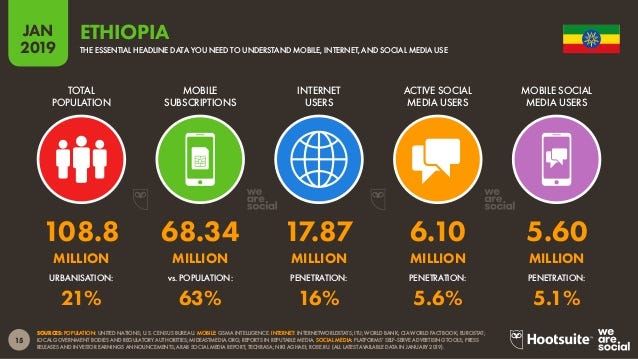At Last Ethiopia Opens Up Its Telecom Industry, Bidding To Start September
At the moment, there is no MTN, Airtel, Safaricom, Vodafone or any other mobile telecom operator in the East African country of Ethiopia, but that will no longer be the case before this year ends. The country is set to award its first set of telco licenses to multinational mobile companies by the end of 2019.
Before this happens, Ethiopia’s government has continually monopolized the country’s telecom industry. Hence, this is expected to end a state-wide monopoly and open up one of the world’s last major closed telecoms markets.

When This Happens, Investors Would Be Looking At Ethiopia’s Population As A Big Bait
- With a population of 105 million people, the second most populous country in Africa after Nigeria will be baiting in squads of investors.
“There will be a bidding war. It’s the last greenfield site. There’s an opportunity to be market dominant,” said one company executive.
- A law to create the new watchdog — the Ethiopian Communications Regulatory Authority — is already being debated by parliament. The new telecoms regulator will issue the licenses when the law is approved and this institution set up.
“By this time next year, we hope that many Ethiopians will be using different SIM cards. We are operating on a very aggressive timeline,” Ethiopia’s State Minister of Finance Eyob Tekalign Tolina said.

- Vodafone, South African operator MTN, France’s Orange and Etisalat of the United Arab Emirates are likely to be among the leading contenders vying for entry into the Ethiopian market. Senior executives from those companies attended a telecoms conference in Addis Ababa this week and met with government officials.
- The bidding process for two licenses will open in September and the licenses would be awarded in December.
- Company executives who met with government officials this week were told to expect an announcement on the liberalization plan, possibly next week.
A Look At Ethiopia’s Telecom Market
- Right now, the average rural inhabitant of Ethiopia has to walk 30 kilometers to the nearest phone. The ETC announced 7 September 2006 a program to improve national coverage and reduce the average distance to 5 kilometers. The ETC has also stated that the rural telecom access within 5 km radius service has currently reached 96 percent.
- Since 26 September 2017, it is not possible to buy and use Ethio Tel SIM cards in mobile devices that haven’t been purchased in Ethiopia or registered with the authorities.
- As of 2012, 20.524 million cellular phones and 797,500 mainline phones were in use.
- Use of voice over IP services such as Skype and Google Talk was prohibited by telecommunications legislation in 2002.
- In 2007, there were just 89 internet hosts. There were 447,300 internet users in 2009. In 2010, just 0.75 percent of the population was using the Internet, one of the lowest rates in the world.
- Telecommunications in Ethiopia is a monopoly in the control of Ethio Telecom, formerly the Ethiopian Telecommunications Corporation (ETC).

With the proposed new reforms, Ethiopia would be seeking to liberalize the country’s economy.
Government officials are already looking at several potential options, including the sale of a minority stake in Ethio Telecom, granting of new licenses to multiple telecoms operators or a combination of both.
The government will expect the winning companies to start operations next year, initially using Ethio Telecom’s infrastructure to run their networks, the sources said.
Ethiopia’s potential as an untapped market could outweigh concerns about any risks, including Ethiopians’ low-income levels and the country’s over-valued birr currency.
There are 31 countries in Africa where there is a state-owned incumbent telco that is either dominant or has monopoly privileges that hamper the growth and efficiency of the market.
These are: Algeria; Angola; Benin; Burundi, Cameroon, Central African Republic, Chad, Comoros, Congo-Brazzaville, DRC, Djibouti, Egypt, Equatorial Guinea, Eritrea, Ethiopia, Gambia, Guinea, Guinea-Bissau, Libya (which has several state entities), Mali, Mozambique, Namibia, Niger, Sao Tome, Sierra Leone, Swaziland, Tanzania, Zambia and Zimbabwe.
Charles Rapulu Udoh

Charles Rapulu Udoh is a Lagos-based Lawyer with special focus on Business Law, Intellectual Property Rights, Entertainment and Technology Law. He is also an award-winning writer. Working for notable organizations so far has exposed him to some of industry best practices in business, finance strategies, law, dispute resolution, and data analytics both in Nigeria and across the world.

